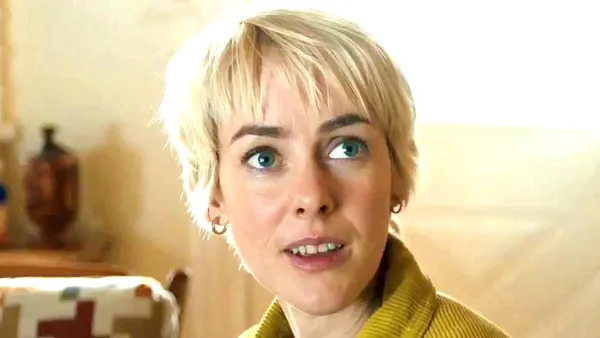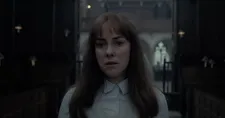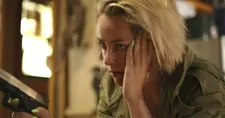 |
| Jena Malone in Adopting Audrey |
Jena Malone is making breakfast when we talk: caramelised onions, scrambled eggs and mushrooms. It’s the start of the Glasgow Film Festival and she has a lot to get through, with two films screening there. One of them, Adopting Audrey, sees her play a listless young woman who forms an unexpected bond with a misanthropic man after deciding to explore the possibilities of adult adoption. In the other, Consecration, which is screening in the Frightfest strand, she’s cast as a woman with a troubled past investigating the death of her brother in a Scottish convent. They’re very different roles, and her ability to disappear into her characters is one of the reasons why she’s loved in the industry, even if it might make her a bit less visible to fans.
“Audrey is based loosely on a true story that Mike Cahill read the story about a woman who had experimented with adult adoption, and sort of just ran with it,” she tells me. “The Audrey that I played was very much a creation, because I never met the original Audrey. Mike didn't, even. I wasn't interested in doing that, but it was loosely based on this episode in this woman's life.”
She hadn’t heard of adult adoption before, she says, but she found the character interesting because she’s so full of uncertainty about her identity.
“I think for 90% of the humans I know, the sense of who they are and their identity is tied to three very loose things. If one of them shifts, the entire sense of their identity changes. Identity is not a concrete thing. I liked that Mike was pushing into this story of a woman that sort of embraced that more, and was in the chaos of it instead of someone trying to sort of concretise something that is deeply indeterminate.”
 |
| Jena Malone in Consecration |
So what are those three things?
“Oh, for how identity changes how you see yourself? You know, you can lose your job, and it changes how you view yourself and your self worth. You could go through a bad breakup, I mean, any traumatic event – I think trauma asks us to rewrite or reexamine who we are. And if there's anything that's not very deeply resonant, then those things are out. You're going to have to start figuring out something new.”
In Consecration,. her character, Grace, has to deal with quite a bit of trauma in her past.
“Consecration is a bit of a fable,” she says. “Fables allow us to push out of the realm of what is normal and biologically sound. So this is a woman that purposely pushed a lot of her memories far away, which, you know, trauma survivors do. It's very easy to put those things in a box and not think about them or try not to reveal them to themselves. And we're meeting Grace at this time where all of a sudden, it's starting to unravel itself. Whereas I think for Audrey, she's very clear on her past, and I think that the trauma that Audrey experiences is a lack of connection and that anchoring to – you know, when you have a good friend, it's an incredible thing. When you have a good friend for 10 years, it anchors you even more to experiences, to be able to look back and have her hold accountability. And if you have a good friend for 20 years, it's an even deeper anchor. And I think that there's a moorlessness to Audrey that makes everything feel like it's either not hers or she's maybe undeserving of it.”
I comment on her chemistry with Robert Hunger-Bühler, who plays the man who provides Audrey with the anchor she needs, and ask if they had time to reverse or if that just happened naturally.
“It just happened,” she says. “The production had some problems with his work visa so he actually didn't come in, we didn't think that he was going to make it. We thought we were going to have to shut down production and find someone else, and we had already started filming. And he came in on a Friday and started shooting on Monday. So we had to figure out how we felt about each other. And he's an incredible actor. He's very kind. He's very giving. He's also extremely funny and easy to work with. And so I feel like it was sort of a divine blessing. It just worked out perfectly.”
Was it straightforward once they were shooting, in terms of the production?
“It was, yeah. I don't think that we encountered any bumps. It just felt like, just let us go and let us experiment and try. And I think that we both really knew who we wanted the characters to be. In this way, at least, they weren't very old friends meeting for the first time. So it worked for the energies of the scene.”
I mention her work last year in Swallowed, where she plays a very different character again, and ask if she seeks out varied roles or if that has just been a matter of luck.
“Oh yeah,” she says. “I mean, we don't want to read the same book again and again. If we read a book about a certain character, we pick up another book, and if it's a similar character it’s going to be like, ‘Oh, I’ve already read about them,’ so you aren’t going to bother. I think humans naturally want to read new stories, you know? We want to learn new things. And I think that's one of the gifts of being this wild human animal that we are.
 |
| Jena Malone in Swallowed |
“For me, it's the same. It's like my journey, you know? You carry a character for so long and you really don't want to have to ask the same questions. And so for me, I love getting to find something new, something that challenges me in a new way. I'm not yet at the point where I'm wanting to just show up and it's a job and I'll just phone it in, whatever that is, if I ever reach that point.”
“Acting as a job,” she adds, as she lifts a frying pan off the heat. “There is commerce to it. It does put food on your plate. But I've been fortunate to try and find roles that feed me in both ways.”
I remark that she’s done particularly well for somebody who started out as a child actor and had to make that transition to adult acting which sinks a lot of people.
“You know what?” she asks. “I don't think I've succeeded, and I don't think I’ve failed. I think that I just keep going right? I'm still working, and that's a gift in itself. Let's be honest, there wasn't a lot of parts when I was 24. There's not a lot of parts now that I'm 38. That's not new to me. I think the scope is bigger because now that I'm 38 it's like, I can touch all of the adult roles, whereas when I was 23, it was sort of like, man, you kind of have to live in a certain box, you look pretty young. It's a very specific thing. I feel like, in a way, even though it doesn't always translate to actual parts, I can play more, I can do more now, whereas when I was 13 I could not play a 23 year old,
“It doesn't always translate to the mechanics of what the story is that society wants to tell. But I always have hope. I think that the world is shifting, and you just have to keep believing that. There'll be more and more femme-forward stories that we want to be a part of. Women show up, we watch movies, our money has no gender. As long as we keep showing up monetarily and creatively, we'll be able to push into far more wild realms of femininity, regardless of age.”





















